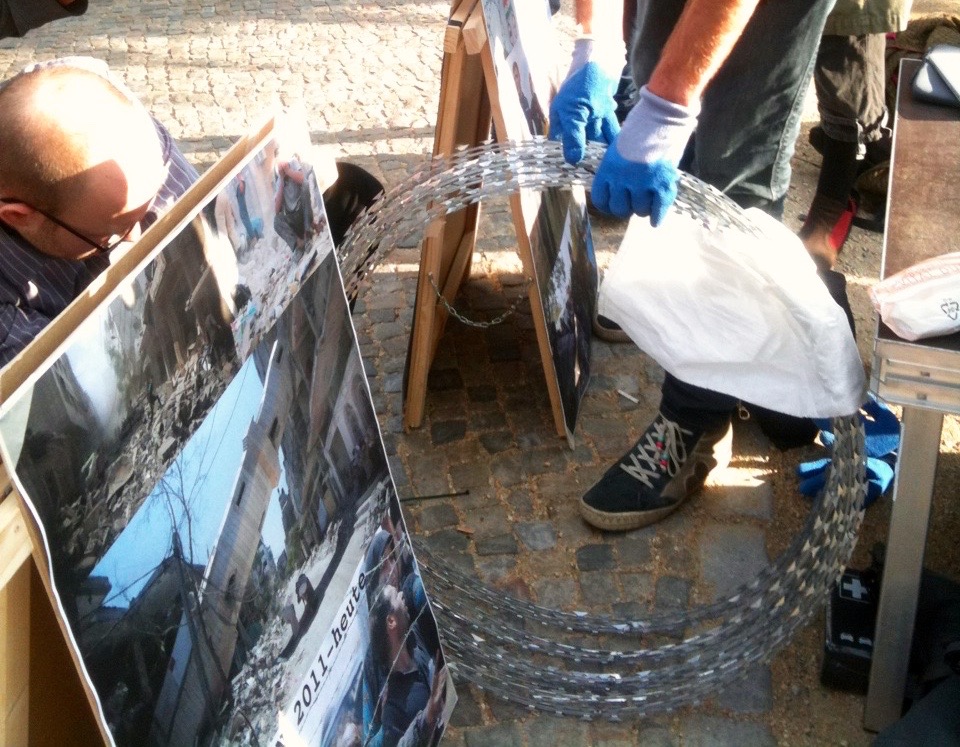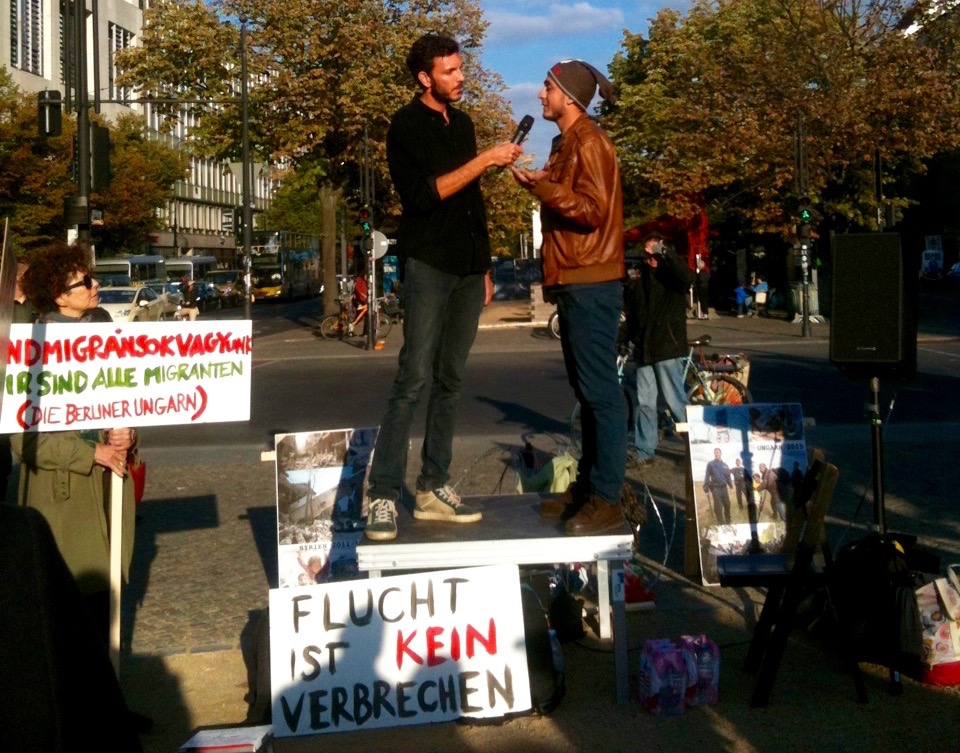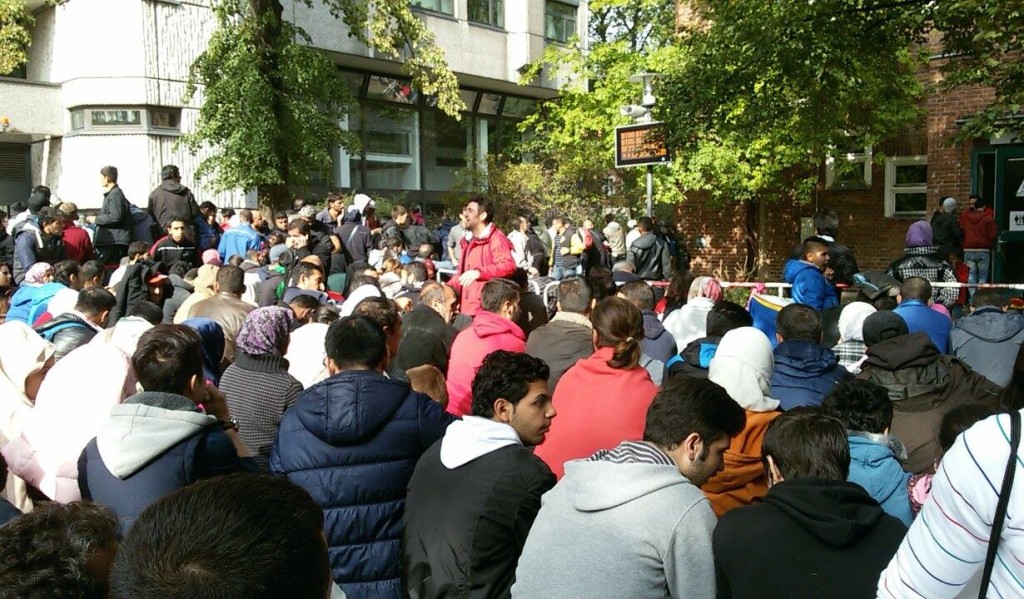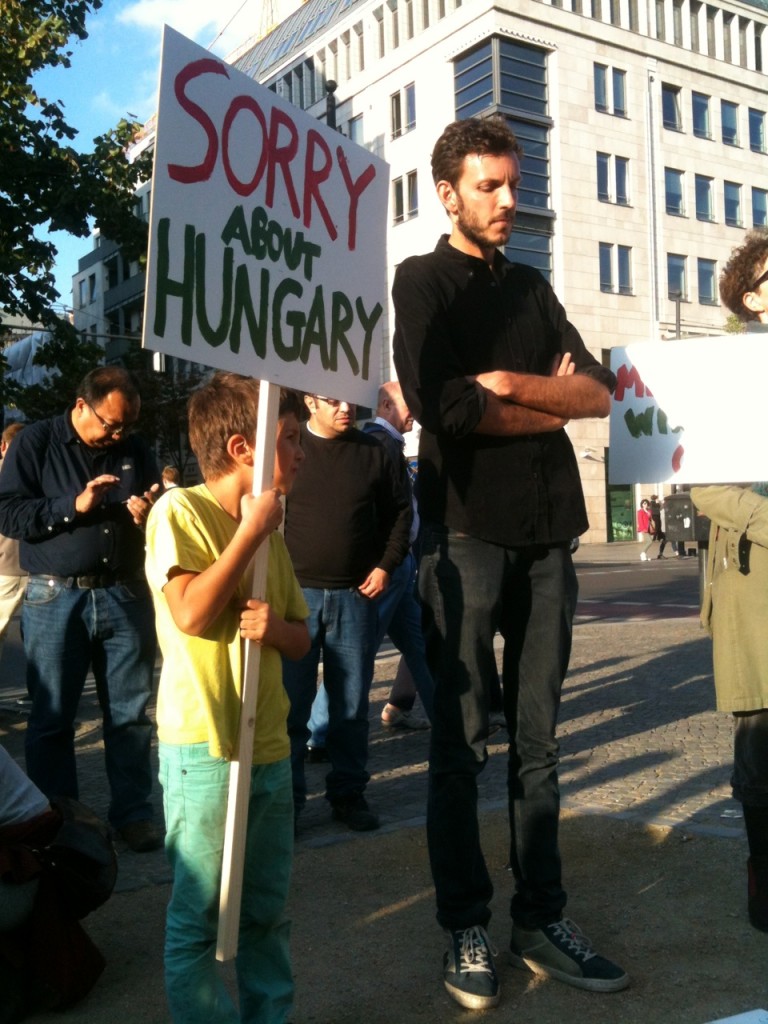Razor Wire and Refugees: What’s Happening Now in Berlin

Across from their embassy in Berlin, Hungarian expats are unspooling razor wire littered with rags of clothing, a symbol of the barrier strung across thousands of kilometres of Hungarian border, between Fortress Europe and legions of refugees escaping conflict zones.
The razor wire, for the demonstration organised last Thursday by Hungarian-German film director Benjamin Cantu, was donated by a Berlin firm, Mutanox. The company refused earlier this month to fill an order by the Hungarian government worth a half-million euros because they knew it would used against refugees.

A Syrian refugee, who had only been in Germany three days, Ahmed Aboras, 25-years old, happened to be passing the demo with his family when he saw the Hungarian flags.
‘I immediately had to go there, they made me so angry, because I had the experience of having to travel through that country’, he told me.
I think he was heartened to meet Hungarians dismayed by their country’s policies, who are willing to go out and protest. He addressed the crowd, telling them about the atrocious treatment he experienced passing into the European Union at the Serbian border. He explains how the Hungarians took his passport (they still have it) then dispatched him by bus to the Austrian border. Ahmad is fighting now to get back his passport and remain in Germany despite being without Syrian-issued papers. His sister lives in Berlin, and he wants to complete his university degree in Economics, which was interrupted by the war. But the German system of distributing refugees across the country, according to the Königsteiner Key, means that he risks being sent to another city in Germany.
Ahmed is from Aleppo. I have strong memories of visiting the city in 2009––its remarkable citadel, the flurry of activity in the intricate souk, the hospitality of an old man who accompanied me in the early hours of the morning chatting from a bakery where I bought bread, asking me for tea. Ahmed and I then talk about the destruction, how the souk is now gutted, and the fact that his parents are still trapped in the city.
His sister, pushing a baby carriage on Unter den Linden, tells me, ‘When I look at my brother’s eyes, I see my father and my mother’s eyes too. I wish they were here with us too’.

Refugees in Berlin are arriving every day––many in specially designated trains arriving at Schoenefeld airport (450 will arrive on Monday morning early, if you are around to help). They end up at Lageso, the regional authority for health and social assistance, first to register and then to have their case processed. As you can see in the above photograph, the authority is overwhelmed with people.
Ahmed tells me, ‘On the first day, 23 September, I arrived at 5 am, to get into line early enough to register. That took me three days. And, since then, I have been there every single day from 8 am to 7 pm waiting for my number to be called. Some people have been waiting for two weeks. There is food and water available, but we’d rather just have our documents’.
I know that these refugees, already in Germany, are the ‘lucky ones’. But doesn’t it strike you too that Lageso could have a more efficient system, so at least people know on which day their number is expected to be called? Having people who have just emerged from a long and dangerous overland journey (13 days in Ahmed’s case) wait outside, often in the cold, day after day, is preposterous. Getting into Lageso might take longer than getting into Europe.
Meanwhile, I am very touched that Berlin continues, even after the rush of initial enthusiasm, to be so engaged with the refugee crisis. Today (Sunday 27 September, from 12 noon) there will be a massive welcome picnic in the Tempelhof airfield. Online platforms such as Netzwerk Berlin Hilft! communicate quickly to volunteers how they can help. The speed and dedication with which the crisis has been engaged locally is heartwarming. If only that could be matched by the authorities, especially at the European level, we would have more to smile about.

by Joseph PEARSON
*This is the second in a series of articles on The Needle about the refugee arrivals in Berlin. Read the others:
1. Why Germany Welcomes Refugees?
3. How Long Will Germany Welcome Refugees?
4. Berlin’s Appalling Conditions at Refugee Registration Centre LaGeSo.

Great article! Thank you. I’m sorry I couldn’t attend the rally.